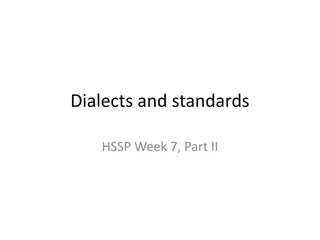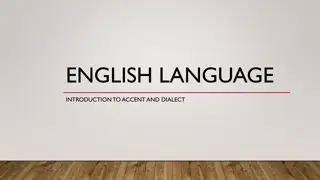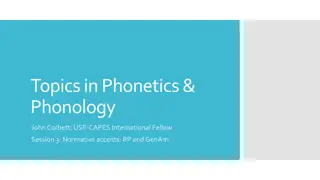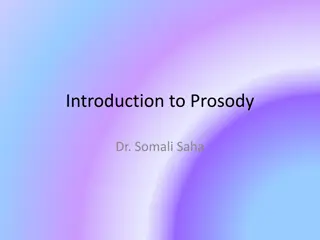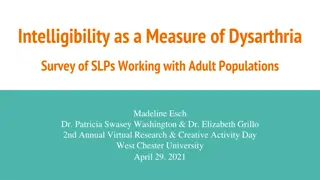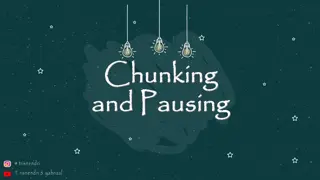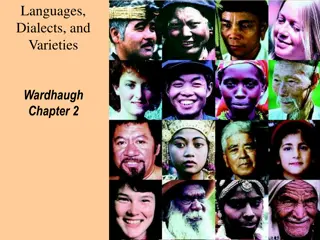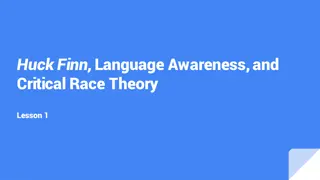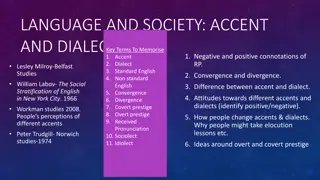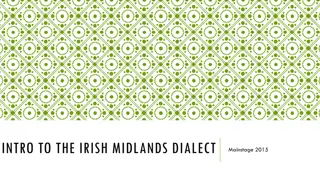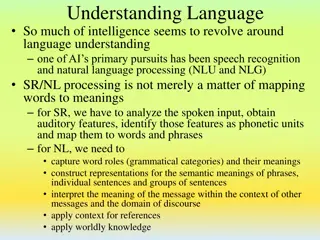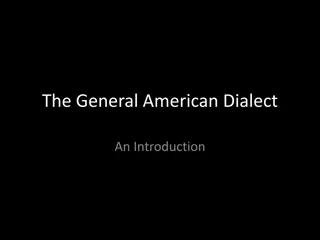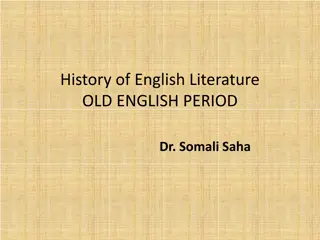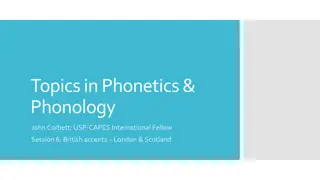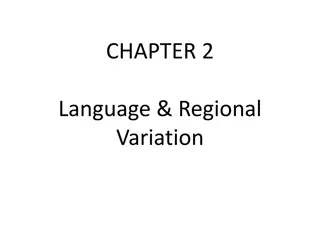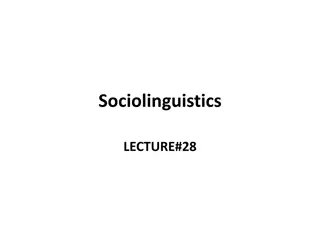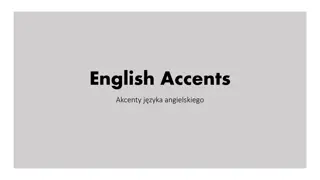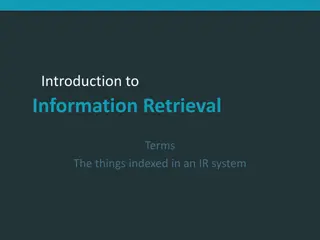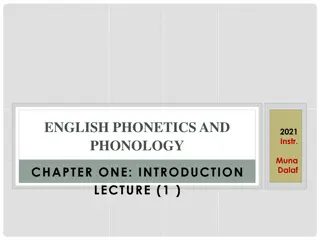English Dialects and Accents
Explore the rich tapestry of English dialects and accents, encompassing historical, regional, social, and stylistic variations in lexis, grammar, and pronunciation. From the distinction between dialect and accent to the social prestige of different regional varieties, delve into the complexities and nuances that shape the diverse landscape of English language diversity.
Download Presentation

Please find below an Image/Link to download the presentation.
The content on the website is provided AS IS for your information and personal use only. It may not be sold, licensed, or shared on other websites without obtaining consent from the author.If you encounter any issues during the download, it is possible that the publisher has removed the file from their server.
You are allowed to download the files provided on this website for personal or commercial use, subject to the condition that they are used lawfully. All files are the property of their respective owners.
The content on the website is provided AS IS for your information and personal use only. It may not be sold, licensed, or shared on other websites without obtaining consent from the author.
E N D
Presentation Transcript
Hughes A., Trudgill P., English Accents and Dialects (An Introduction to Social and Regional Varieties of English in the British Isles), Fourth Edition; Hodder Arnold: 2005 http://sounds.bl.uk/Sound-Maps/UK-Soundmap/full-screen
VARIETIES OF ENGLISH historical regional social stylistic variability of lexis, grammar, pronunciation
DIALECT or ACCENT ? dialect common lexical, grammatical, phonetic features accent common phonetic features
standard Regional vs. social variability: S O C I O L E C T S regional variation REGIONAL DIALECTS
Example: h-dropping in West Yorkshire: Upper-middle class: 12% Lower-middle class: 28% Upper working class: 67% Middle working class: 89% Lower working class: 93% The lower the social class, the stronger the traits of the regional accent
Variability within Standard English: STANDARD ENGLISH BRITISH AMERICAN English (England, Wales) Irish Scottish
Social prestige of regional dialects depends on the relative social/economic/political power of their speakers RP: received pronunciation accepted in the best society 19th century (Queen s English, BBC English): only 3-5 % of speakers today Estuary English perhaps the most prestigious regional accent today, but the popularity of individual accents may be affected by the entertainment business (movies, pop culture etc.) http://www.dailymail.co.uk/femail/article-2266574/Shut-UP-The-Essex-accent-revealed-worst-Britain-women7-admit-swooning-soft-Irish-twang.html
GRAMMATICAL VARIATION ACROSS REGIONS Nouns -unmarked plurality in nouns of measurements: a hundred pound, five foot (even in colloquial SE)
GRAMMATICAL VARIATION ACROSS REGIONS Nouns -unmarked plurality in nouns of measurements: a hundred pound, five foot (even in colloquial SE) Pronouns us objective case of I (north-eastern England, Scotland)
GRAMMATICAL VARIATION ACROSS REGIONS Nouns -unmarked plurality in nouns of measurements: a hundred pound, five foot (even in colloquial SE) Pronouns us objective case of I (north-eastern England, Scotland) Give us a kiss historical forms for the 2ndperson singular still in use: thou, thee, thy, thine (north of England, rural south-west) thou, thee = tha (north of England) tha cast = you can (cast the old form for the 2ndp. sg. < canst)
Some varieties (South-West England: Devon, Somerset) contrast strong and weak pronouns (accented : unaccented) rather than common case and objective case forms of pronouns strong you he she we they weak ee er (subject), n (object) er us m We wouldn t do it, would us? Give n to she. Mass nouns may be referred as it, countable nouns as he, er, n Pass me the bread. It s on the table. Pass me the loaf. He s on the table.
Reflexive pronouns (in many non-standard dialects): myself herself yourself itself hisself ourselves theirselves Note: Initially, all reflexive pronouns consisted of the personal pronoun and self. The combination of possessives and self is of a later date, as is the plural marking of selves (self used to be an adjective and not a noun). In SE, the substitution of new forms has not spread to the 3rdperson, in regional varieties it has.
Demonstratives north of England, Scotland: three-way demonstratives close to the speaker: close to the addressee: distant from both: this that yon these (NE) them yon thir (Sc) they, thae yon, thon Relative pronouns That was the man what done it. (particularly common) That was the man which done it. That was the man as done it. That was the man at done it. That was the man done it. That is the man what his son done it.
Comparison of adjectives: She s more rougher than he is. He s the most toughest bloke I ve met. You ought to be carefuller in future. Note: Double comparative/superlative marking common in Shakespeare. Adverbs He ran slow. She spoke very clever. They done it very nice. Note: The original adverbial suffix was e, which was dropped in Middle English and later replaced with ly.
Verbs Irregular verbs: reduction of forms, regularization of verbs
Verbs Irregular verbs: reduction of forms, regularization of verbs (The process started in Middle English, but was interrupted in the 18th century, when English got its standard form with the first dictionaries and grammar books). see seen seen or see see seen give give give come come come go went went write writ writ draw drawed - drawed
Present Tense forms: the ending s either missing or generalized: He don t like it. (East Anglia, American, Caribbean) He don t like it. (East Anglia, American, Caribbean) We goes home. (north of England, south-west, South Wales) Scotland, Northern Ireland present : historical present I go home every day. I goes down the street. I sees this man.
Negation Negation multiple negation = negative concord multiple negation = negative concord in most parts of the British Isles: I didn t have no dinner. ain ain t t [ [e nt very common, but not throughout Britain e nt, , nt nt, , nt nt] ] = am not, is not, are not, have/has not < amn t I ain t coming. I ain t done it. no, nae, na no, nae, na for not (Scotland): He s no coming. I ve nae got it. I cannae go. We do na have one. never never as past tense negative: In most parts of British Isles
AUXLIARIES have have stative : dynamic use SE: I haven t any money. I didn t have coffee with my breakfast. AE: I don t have any money. I didn t have coffee with my breakfast, ScE: I haven t any money. I hadn t coffee with my breakfast.
American, British English: have > have got (informal) Younger speakers > no distinction between stative and dynamic have: Have you got any money? (informal) Have you any money? Do you have any money? (younger speakers) (formal, older speakers) do Full verb, auxiliary function SE: do did done Most non-standard d s: do do did done (auxiliary) (full verb) done You done lots of work, didn t you? I did. I done it last night.
be North-eastern England: is for all persons: I is... Parts of West-Midland: am for all persons: You am... South-western England: be for all persons woz for all persons; You woz...
modal auxiliaries must SE, southern English: a) deontic: He must do it. He has to do it. He s got to do it. He hasn t got to do it. He mustn t do it. He doesn t have to do it. b) epistemic: He must have seen it. He can t have seen it. Northern English epistemic: He mustn t be in. Younger speakers: ought (to), used (to) with do They didn t used to go. (= They used not to go). He doesn t ought to go. (= He ought not to go)
QUESTION TAGS: north-eastern Scotland: same polarity tags: It s a fine day, is it? the use of innit as a general tag (marked as slang)
Contracted forms: South of England: I haven t got it. She won t go. Doesn t she like it? North of England: I ve not got it. She ll not go. Does she not like it?
word order SE: She gave the man a book. She gave him it. She gave him the book. She gave the book to the man. She gave it to him. South of England: to prefered if DO is a pronoun North of England: She gave it him (acceptable in the south) She gave it the man (not found in the south)
PRONUNCIATION VARIABILITY: within RP, regional RP: older speakers : younger speakers social classes acquisition of RP Conservative RP General RP Advanced RP Adoptive RP...
Regional variability: https://www.youtube.com/watch?v=-8mzWkuOxz8 Main division: Southern: (foot-strut split) RP, Cockney, Estuary, Kentish, Sussex, Essex... South-West (rhotic, no trap-bath split) East Anglian, South Midland (no H-dropping, complete yod-dropping) Northern, Midland, southern Irish: Geordie, Cumbrian, Yorkshire, Lancashirian Scouse, Brummie, Dublin, Cork Scotland, north of Ireland: Glaswegian, Highland, Scots, Ulster English Wales: southern, northern
CONSONANTS Post-alveolar approximant /r/ rhotic rhotic non non- -rhotic rhotic accents accents rhotic accents non-prevocalic [ ] 18th c. : NE /r/ > / _ {C, #} rhotic: General American, Scotland, Ireland, south-western England non-rhotic: England, Wales, Australia, New Zealand, southern USA, New York, New England,South Africa, Caribbean...
rhotic rhotic and and non non- -rhotic rhotic accents accents in in England England: : end of 20th c. 1950s
rhotic rhotic and and non non- -rhotic rhotic accents accents in in England England: : 1950s end of 20th c.
many variants of /r/ : alveolar tap [ ] (Scotland, Wales, northern England) retloflex approximant [ ] (Highland, Ireland) alveolar trill [r] (Scotland, but rare), uvular fricative [ ] (rural north-east) labio-dental [ ] in younger speakers in the south of Englands
Glottal stop RP speakers: - Before word-initial vowels - before consonants in syllable-final environment: six [s ks] - glottalization - instead of the linking r - instead of word-final or morpheme-final plosives, especially if the next consonant has the same place of articulation: - get down [ge da n] Scotland [ sk l nd] back garden [b g :dn]
More More common common in r in regional egional varieties: varieties: - as allophone of medial and final /t/: most frequent word finally before a C before a syllabic n word finally before a V before syllabic l medially before a V that man button that apple bottle better least frequent Increasing use of [ ] instead of [t] in younger speakers in all regions ] instead of [t] in younger speakers in all regions Exceptions: parts of Wales, northern Scotland North-eastern England, East Anglia, Northern Ireland, north-eastern Scotland: glottalization glottalization of /p, t, k/ of /p, t, k/ [ fl p ]
H H- -dropping dropping
H H- -dropping dropping In many RP speakers /h/ is mute in initial position in unstressed pronouns and auxiliaries: [ st p m] stop (h)im H-dropping much more common in other varieties: NO H-dropping in Scottish and Irish accents.
Lateral /l/ Lateral /l/ clear/light [l] before vowels and /j/: like dark [ ] before a consonant and syllabically: bottle Voiceless [ ] after /p/ and /k/: plate, clap NE: L-vocalization: early process all, folk, calf, Holmes, chalk... Some RP speakers use a vowel instead of the dark /l/: milk, well especially common in: Cockney, Estuary English, Manchester, Bristol...
Semi Semi- -vowel /j/ vowel /j/ yod-coalescence = merger of /j/ with preceding alveolar plosives to form affricates dune = June What you need [w ni:d] Would you [w ] R! : NE [s] + [j] > [ ] NE [z] + [j] > [ ] NE [t] + [j] > [ ] NE [d] + [j] > [ ] sol Ru Russia preci cision na nature soldier AFTER ACCENTED SYLLABLES yod-dropping = loss of /j/ In early NE after [r] in most RP (younger) speakers today also after /l/ and /s/ rude, Luke, allude, super, suit, suitable London (northern parts), American E.: London (northern parts), American E.: after all alveolars: news, duty, student North of England: North of England: after [ ]: enthusiastic Eastern England: Eastern England: after all consonants before [u:]: music, human, beauty
[] (g-dropping) Most RP speakers have [n] in ing. Western central England (Manchester, Liverpool, Birmingham): singing [s g g]
VOWELS [ ] : [ ] : [u:] ] : [ ] : [u:] The strut-foot split
VOWELS [ ] : [ ] : [u:] ] : [ ] : [u:] In western parts [ ] realized as [ ]. one, none, tong [ ]: much of the north of England [ ] : [u:] [ ] favoured in the East, [u:] in the west: book, room
[] : [:] ] : [ :] The The trap trap- -bath bath split split
[] : [:] ] : [ :] [ ] is [a] in younger RP speakers (lowering of vowels chain shift) RP: [ ] / [a]: pat, cap, land [ :] a) a) Before voiceless fricatives Before voiceless fricatives: path, laugh, grass but: maths, daffodil, gas, ass, mass southern accents Northern accents, Scottish, Northern Irish [a]
b) b) b before efore n n/m /m + consonant + consonant dance, grant, demand, example but: romance, pant, band, camp Welsh, Irish, Australian have [ ], although [ :] in path c) c) before before non non- -prevocalic prevocalic /r/ part, bar not in rhotic accents /r/ d) d) before before former former l + palm, half, banana, tomato... l + labial labial, some , some other other lexical lexical items items
b) b) b before efore n n/m /m + consonant + consonant dance, grant, demand, example but: romance, pant, band, camp Welsh, Irish, Australian have [ ], although [ :] in path c) c) before before non non- -prevocalic prevocalic /r/ part, bar not in rhotic accents /r/ d) d) before before former former l + palm, half, banana, tomato... l + labial labial, some , some other other lexical lexical items items
Diphthongs Diphthongs centring centring diphthongs diphthongs: : [ , , , ] the result of V + r > not in rhotic accents

 undefined
undefined

























